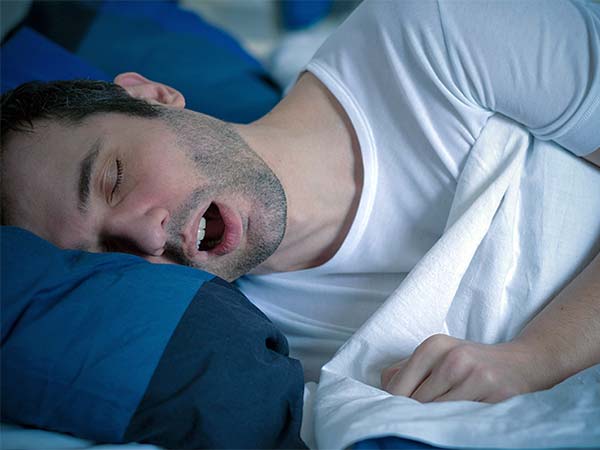
Snoring
Do you snore?
Everyone snores once in a while. If we are extra tired, eat too much, take medication or are congested from a cold, we may snore occasionally, which is normal. If you snore every night, or snore so loudly that your sleep partner can't stay in the same room, it's time to talk to your doctor.
What causes snoring?
The muscles in the top of the mouth (soft palate), tongue, and soft tissue in the throat and airway become fully relaxed during the deep stages of sleep. As these structures relax, they lose firmness and may shift position to form a soft obstruction in the upper airway. When the patient inhales and exhales, air flow passes around the tissue obstruction, causing it to vibrate and creating the rattling sound of snoring.
Temporary snoring can occur with nasal congestion due to a cold or allergies; congestion causes the throat to swell and can make the upper airway passage narrower.
People that snore are often more prone to snoring when they sleep on their back. When the relaxed soft palate, tongue or throat tissue are already nearing the airway during sleep, sheer gravity can cause them to fall backwards, blocking air flow even further.
Snoring is more common in men than women. Men have larger airways, and their airway muscles (pharynx) are positioned lower in the neck than women. This increases neck size and expands the amount of airway soft tissue or fat deposits that may compress or obstruct the airway to cause snoring.
Snoring and Breathing
Repeat loud snoring may be a sign of a sleep breathing disorder, such as upper airway resistance syndrome, hypopnea, or obstructive sleep apnea.
If sleep breathing is impaired, this could mean the body is not getting enough rest or is being harmfully affected by reduced blood oxygen levels during sleep.
In addition to chronic, loud snoring, symptoms of sleep breathing disorders can include:
- Morning headaches
- Feeling fatigued (even though you just woke up)
- Excessive daytime drowsiness
- Inability to concentrate or depression
- Waking up suddenly while sleeping, gasping for air
If you snore heavily and are experiencing these or other symptoms, please consult with your doctor to rule out a sleep breathing problem. Sleep breathing disorders may be linked to other illnesses, or can lead to serious conditions like heart disease, high blood pressure or diabetes.
How do I stop Snoring?
Occasional snoring is often manageable by talking with your doctor about your overall health. If you have allergies, sinus problems or enlarged tonsils, treatment of these conditions may alleviate snoring.
Excess body weight and fat in the neck area has a compression effect on the muscles and soft tissue in the upper airway region, increasing the risk of snoring. Losing weight can often make a big difference in reducing or eliminating snoring.
Alcohol and sedatives make the tongue and throat muscles heavily relaxed during sleep, increasing the likelihood of snoring if they obstruct the airway. Limiting use of these substances at bedtime may help reduce snoring.
Oral Appliance Therapy for Snoring
Dentists trained in dental sleep medicine have completed advanced training to provide oral appliance therapy for relief from snoring. The dentist designs a removable oral appliance that looks like an orthodontic retainer to be worn by the patient during sleep to help prevent snoring. The oral appliance fits over the teeth and is adjusted to shift the lower jaw (mandible) slightly forward to keep the airway open during sleep.
Dr. Phillip Durden has worked with Athens area physicians and sleep specialists for over two decades to help patients improve their sleep health and reduce snoring with oral appliance therapy.
During your initial consultation at Dental Sleep Medicine of Athens, Dr. Durden will review your physician's recommendations and take any necessary x-rays to evaluate the health of your jaw, teeth and facial muscles. After discussing your oral appliance therapy treatment plan with you, he will take impressions of your bite and work with our dental laboratory to design your oral sleep appliance.
Dr. Durden will continue to see you for follow-up visits to monitor your progress and adjust your sleep appliance as needed to help you enjoy snore-free, restful sleep. Learn more about oral appliance therapy.
Dental Sleep Medicine of Athens
Dr. Phillip Durden provides oral appliance therapy for treatment of snoring, bruxism/clenching, TMJ disorders and CPAP intolerance at our dental sleep medicine center, located 7 minutes east of Athens, Georgia.
If you (or your partner) are tired of loud snoring and disrupted sleep, we invite you to Contact Dental Sleep Medicine of Athens for information about oral appliance therapy for snoring or sleep disordered breathing.